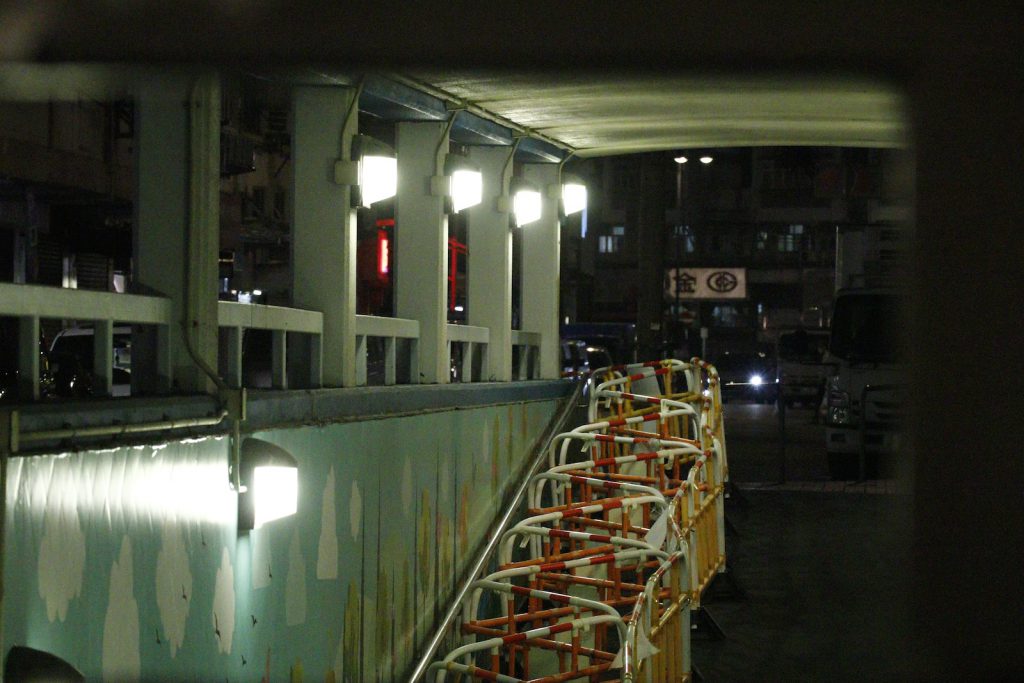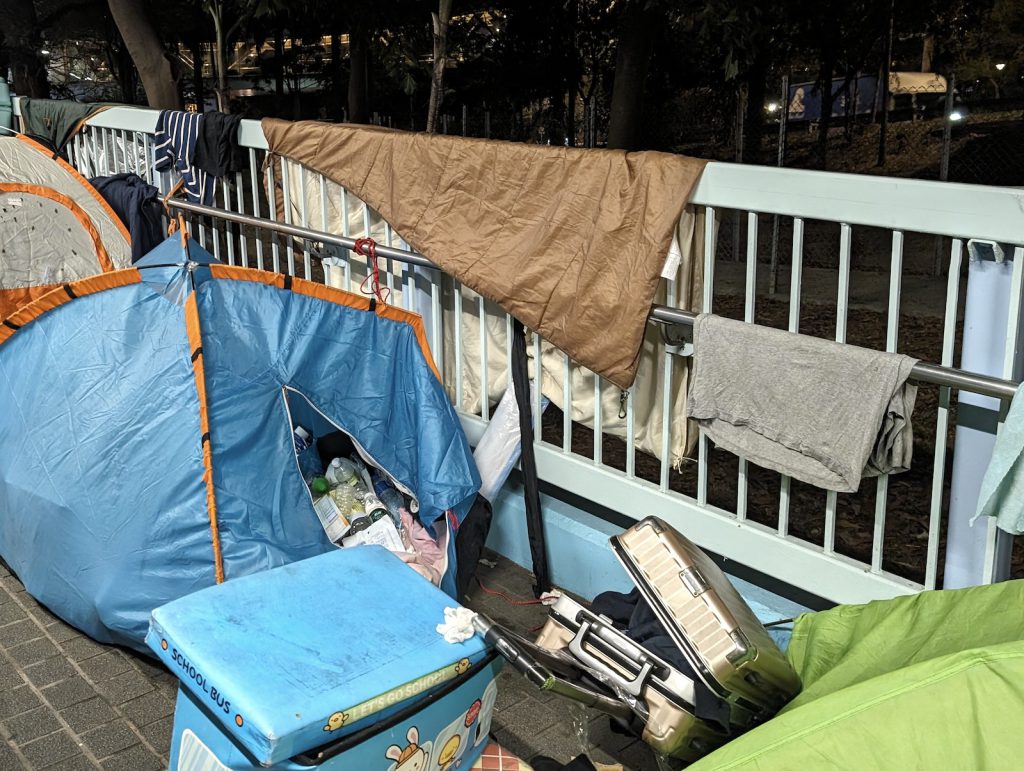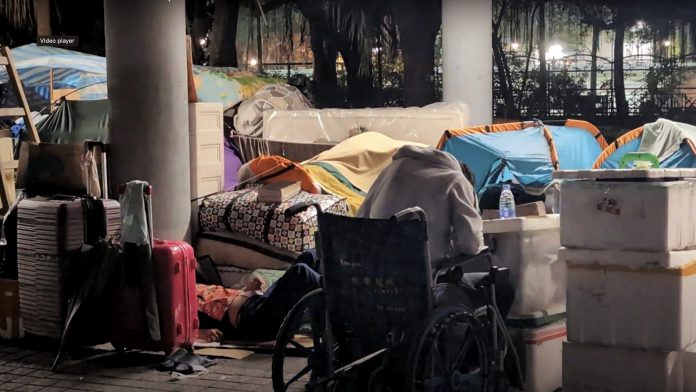The homeless struggle to live as their belongings and living space are stripped away by the government.
By Charley Ho, Roy Ng & Daniel Paek
Sleeping in Tung Chau Park in Sham Shui Po, Ah Bing stays alert for her belongings every day after all her belongings were dumped as rubbish by government contractor cleaners in 2019.
The 60-year-old homeless woman is angry that everything she had was taken away. “There was no prior notice, and all my clothes were suddenly treated as rubbish. Most of my belongings disappeared,” she says.
“I am extremely sad about losing the clothes that my sister gave me before she passed away. Every time I mention it, it makes my heart ache,” the street sleeper who prefers to be addressed as Ah Bing adds.
On the eve of the 2019 Winter Solstice, homeless people sleeping in Tung Chau Street Park in Sham Shui Po, had their belongings confiscated and discarded by the Leisure and Cultural Services Department and were evicted by riot police in an anti-crime operation.
One of them was Ah Bing. Together with eight other homeless people, they took the government to court and each received HK$100 (US$12.78) in compensation after two and a half years. The court ruled that the government had failed to properly handle their belongings during the park clearance operation.
Despite the favourable ruling, no apology to any of the homeless people has been issued.
The Small Claims Tribunal later also rejected an appeal regarding the amount of compensation, ruling that the adjudicator is not required to make unnecessary inquiries into the issue of mental distress.
The Court ruled that the plaintiffs failed to prove their actual losses from the clearance operation, upholding that HK$100 (US$12.78) was a suitable amount for symbolic compensation on July 21, 2022.
Street sleepers not only risk having their possessions taken away, some homeless even face forceful eviction.
Sleeping under a bridge, Chi Goh, 62, now struggles not just to keep his possessions but his spot on the street. He is forced to stay about 100 metres away from a subway where he used to sleep, as fences are installed in the Cherry Street Subway in Tai Kok Tsui.
A section of Cherry Street Subway was blocked with fences due to “maintenance work”, according to a notice jointly issued by seven government departments on March 15, 2024.

The Yau Tsim Mong District Office says it received numerous complaints about the accumulation of miscellaneous items leading to obstructions, environmental hygiene problems, and public safety concerns. Renovation and beautification works on the affected section are expected to be completed this summer.
The Social Welfare Department says it coordinated outreach service teams to visit and assist the affected homeless before blocking the subway and on the day of the blockage. They also advised the homeless to access assistance services.
While facing forced eviction by government action, Chi Goh finds it hard to find affordable housing.
As a freelance driver, his monthly income is unstable, ranging between HK$10,000 and HK$29,000 (US$1,279 to US$3,711).
According to the current public rental housing policy, a one-person household cannot earn more than HK$12,940 (US$1,656) per month and has a net asset over HK$286,000 (US$36,566) to be eligible for public housing.
“The government traces my annual income from the past, and the amount has exceeded the limit… But I can’t afford to stop working for a year just to apply for a public housing unit. It’s unrealistic. I don’t expect anything from the government. I’d rather rely on myself. They have their heads in the clouds,” he says, adding he has to cover his other living expenses.

And he does not want to reveal his plight to his family. “I don’t want my son to know about my situation and I don’t want to bother my son who is now in a relationship,” he adds.
Social worker Ng Wai-tung, a community organiser at the Society for Community Organisation, points out that many street sleepers are unwilling to take legal action or engage in dialogue with government officials to solve their problems.
“They don’t want their families to find out they are street sleepers. They are worried that their identities might be exposed if their court cases or meetings with the government are reported by the media,” Ng says.
Having helped the homeless in the city for more than 20 years, Ng says they have very limited housing options, and social welfare support for them is inadequate.
“The cheapest sub-divided flats cost HK$4,000 (US$512) a month in rent, while cubicle apartments with shared bathrooms cost at least HK$2,000 (US$256). The price per square foot is among the most expensive, while the living conditions are the worst. The flats are stuffy, noisy, and infested with fleas,” Ng says.
“The number of homeless people has doubled since 2014, yet the government has only increased the number of temporary shelters and hostels by 10%. There are about 1,470 homeless people now,” he adds.
Ng notes that many temporary shelters are located in remote sites with limited access to public transport, and the homeless are also worried about security issues in the shelters such as theft due to the lack of lockers.
Ng also points out that only less than half of the homeless are receiving Comprehensive Social Security Assistance. “They generally want to make a living on their own and don’t want to bother others. I hope this vulnerable group will soon be destigmatised, and that Hong Kong will become a compassionate community,” he says.
Edited by Lorraine Chiang







































